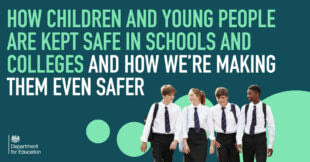How children and young people are kept safe in schools and colleges – and how we’re making them even safer

https://dfemedia.blog.gov.uk/2021/05/25/how-children-and-young-people-are-kept-safe-in-schools-and-colleges-and-how-were-making-them-even-safer/
How children and young people are kept safe in schools and colleges – and how we’re making them even safer
Posted by: Media Officer, Posted on: – Categories: Primary Schools, Secondary schools
Schools and colleges play an essential role in building a safer society by educating young people about key issues like sexual violence and harassment but at the same time they must be safe places where young people are protected as they learn.
Here are some of the ways schools are keeping pupils safe:
All school staff should receive safeguarding and child protection training and all schools should have a designated safeguarding lead and an effective child protection policy
We publish statutory guidance – which means schools have to follow it by law – called Keeping Children Safe in Education.
It provides information and guidance on a wide range of things, including how to respond to and deal with accusations of abuse between pupils, how to spot signs of abuse and neglect, guidance on the many forms that abuse and harassment can take and much more.
It also explains the structures that schools must have in place and this includes having a specific child protection policy, which Ofsted will look at during inspections, and a designated safeguarding lead to whom all staff know to turn to when issues arise.
We’ve set up a helpline with the NSPCC (0800 136 663 or email [email protected]) for individuals to share their concerns and speak out about anything they feel is not right, safe in the knowledge that they will be supported appropriately
The Report Abuse in Education helpline can be used by anyone – children, young people, parents, teachers, school staff and others – to report any concerns. It was set up earlier this year in response to allegations being reported on the Everyone’s Invited website.
Since it was set up in April it has taken more than 320 calls and referred more than 60 of those to statutory agencies like the police or social services. Where that isn’t the case, callers are either given advice on the phone or referred to other experts.
We’ve asked Ofsted to look carefully at the safeguarding measures schools and colleges have in place, as well as assessing whether extra support is needed for teaching about sex and relationships
Ofsted will work with a reference group made up of representatives from social care, police, victim support groups, education leaders and the Independent Schools Council to make sure their work is directed by the views of a wide range of experts.Ofsted will report back to the Secretary of State shortly..
We made relationships education compulsory for all primary and secondary aged pupils for the first time from September of last year
The new relationships, sex, and health education (RSHE) curriculum has been designed to make sure young people learn about respect, consent and privacy. They should understand why challenging stereotypes is important and learn about healthy relationships from an early age.
The curriculum starts with relationships and health education for primary aged pupils and includes sex education for secondary aged pupils.
The new curriculum was designed after thorough consultation and aims to ensure that we are building a safe society where young people understand what it means to respect others and what healthy relationships are.
We have produced extensive guidance for schools to help them navigate what can be difficult issues and to help them foster respect and healthy communication between pupils.
Ultimately, if a school is found to not be keeping its pupils safe, the Department has the power to make sure it either improves or closes
We know the vast majority of schools take their responsibility to protect and care for their pupils very seriously – for those that do not meet the strict safeguarding standards we have in place, we will always take action.
Sharing and comments
Share this page
Related content and links
About the Education Hub
The Education Hub is a site for parents, pupils, education professionals and the media that captures all you need to know about the education system. You’ll find accessible, straightforward information on popular topics, Q&As, interviews, case studies, and more.
Please note that for media enquiries, journalists should call our central Newsdesk on 020 7783 8300. This media-only line operates from Monday to Friday, 8am to 7pm. Outside of these hours the number will divert to the duty media officer.
Members of the public should call our general enquiries line on 0370 000 2288.
Categories
Recent blog posts
- Three key things the new skills bill will do for you.25 May 2021
- How children and young people are kept safe in schools and colleges – and how we’re making them even safer25 May 2021
- What you need to know about the Holiday Activities and Food (HAF) programme20 May 2021
- Are you a Parent? Pupil? Teacher? Student? Find out what stage 3 of the roadmap means for you?18 May 2021
- The removal of Letters and Sounds 2007 from the Department’s list of validated phonics programmes – teachers’ questions answered17 May 2021











Responses